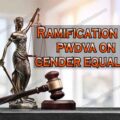The Delhi High Court has pronounced that the entitlement of women to assume the role of Karta within a Hindu Undivided Family (HUF) remains uninhibited by legislative prescriptions or traditional Hindu legal norms. In articulating their decision, the division bench, comprising Justice Suresh Kumar Kait and Justice Neena Bansal Krishna, underscored the imperative that societal perceptions should not serve as a basis for abrogating statutory rights expressly conferred by legislative enactments.
“To say that a woman can be a coparcener but not a Karta, would be giving an interpretation which would not only be anomalous but also against the stated Object of introduction of Amendment [in the Hindu Succession Act, in 2005],” the court said.
Initiating the judgment with a quote from Ruth Bader Ginsburg, the former Associate Justice of the Supreme Court of the United States, the bench commented on the existing hesitancy to recognize women as Kartas, despite the granting of equal coparcenary rights comparable to men.
“Men and women historically were born equal. However, over a period of time, with the advancement of civilization and hierarchical division of society, women have been pigeonholed according to gender roles which progressed into an act of prelation that has relegated them to a secondary position in society,” the court said.
It added: “Similarly, the Amendment of 2005 to the Hindu Succession Act, 1956 which has conferred coparcenary rights to the women, equivalent to that of men, is a quintessence of another reform in law relating to women empowerment. However, the unwavering certitude in marginalisation of women, so deeply entrenched in Society, is perceived to be imperilled by the prospect of a woman taking the position of Karta in an HUF, a role that was traditionally assumed by men.”
The bench accentuated that the unambiguous language of Section 6 within the 2005 Amendment Act unequivocally extends parity of entitlements, embracing all coparcenal privileges, including the prerogative of a woman to assume the mantle of a Karta. The court expounded that positing the proposition that a woman may function as a coparcener but is precluded from acting as a Karta would entail a construction not only incongruous but also contrary to the legislatively articulated purpose behind the Amendment.
Furthermore, the court elucidated that notwithstanding the preclusion of simultaneous Karta positions within a Hindu Undivided Family (HUF), delegation of managerial responsibilities to another coparcener remains a permissible recourse under specific circumstances. Additionally, the court clarified that the assumption of the role of a Karta by a female coparcener does not derogate the rights of coexisting coparceners. It emphasized the continuity of their unaltered entitlements, interests, and coparcenary rights in such instances.
“If there arises any scepticism about the skills, efficiency, sincerity or ability of female Coparceners to act as the Karta or being influenced by her in-laws, the other Coparceners have adequate remedies to seek for a partition or impeach any wrongful alienation of property made by the Karta,” the court said.
The court dismissed the notion suggesting that the husband of a female Karta could indirectly wield influence over the affairs of her father’s Hindu Undivided Family (HUF). Characterizing this viewpoint as “narrow-minded,” the court noted that Section 14 of the 1956 Act was deliberately enacted by the legislature to counter such perspectives. This statutory provision aims to grant women the substantial right to full ownership of their property, addressing a historically delayed acknowledgment of this entitlement.
“If a woman is proscribed from becoming a Karta in view of this reasoning as cited by the appellant, it will only render the legislative endeavour to give rights in immovable properties to women through Section 14 of the Act,1956 as a mere mirage. Ergo, a woman who has absolute ownership in a property cannot be denied a right to manage it on the warped reasoning that she may get influenced by her in-laws. Thus, societal apprehension and reluctance can never truncate legislative enactments to do away with patriarchal discrimination,” the court said.Top of Form
The court said this while rejecting a petition that disagreed with a judge’s decision. The judge had ruled that the eldest woman in a Hindu Undivided Family (HUF) can become the Karta without any legal problem. Also, the court officially named Sujata Sharma as the Karta of the HUF called “D.R. Gupta & Sons HUF.”





